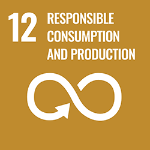About Responsible Consumption and Production
Ensure sustainable consumption and production patterns.

We work towards the UN's Sustainable Development Goal 12 - Responsible Consumption and Production, to create a better and fairer world.
The 2030 Agenda for Sustainable Development was adopted in 2015 by all United Nations member states. It provides a blueprint for peace and prosperity for people and the planet.
Find out more about our work across all the UN's Sustainable Development Goals.
Ensure sustainable consumption and production patterns.

Stirling Management School have focussed one of their key research themes around SDG 12 and conducts research which investigates change in the consumption and production lifecycle, bridging the gap between business, markets and consumer behaviours, through research in retailing and supply chains; consumer behaviour; sustainability and consumption markets.
This project, funded by The Royal Society of Edinburgh, looked at the potential role played by informal food economy (IFE) actors across the Western Isles of Scotland. Despite being part of an advanced market economy, food access and security in this region has previously been identified as problematic for some consumer groups and communities.
The research found that due to the expansion of the formal retail sector, including online delivery services, food access has become less of an issue for many island residents. Nonetheless, IFEs can still help to strengthen social and community linkages and for certain segments of the island population, they continue to play a key role in providing access to food.
This continuing role is important as the research also identified an increasing reliance upon a small number of national retail chains, suggesting that future food security in remote and rural communities could become increasingly vulnerable to market externalities, including climate change.
Wicked Problems/Sustainable Solutions is a first-year module available to students across the University. It takes an innovative, interdisciplinary learning approach to introduce students to perspectives on sustainability and the climate crisis, using the United Nations SDGs as openings to wider exploration.
Contributions from academic staff in all five University Faculties, who are engaged in research to find solutions to some of the most ‘wicked’ problems that affect us globally, underpin seminar-based learning. Students use hands-on practical outdoor experience, app-driven modelling, social and multi-media communications, and debate and dialogue, to explore and address the nature of this ‘wickedness’.
Through understanding of political processes and activism, the role of (mis)informative communication, education-enabled opportunity, conflicts between traditional resource management and new methods of achieving food security, ethical business practices, and how to achieve transitions to a low carbon future that is just and equitable for all, we are equipping future graduates from any discipline with the skills to tackle the challenges ahead.
Greenlaunch is an online seven-week skills and training programme to help participants accelerate the development of their business ideas. Delivered by the University of Stirling’s Enterprise Programme and Scotland’s International Environment Centre, 'GreenLaunch’ aim to support promising Green business ideas to develop and launch by providing tailored training through a mix of workshops, peer-to-peer learning and individual mentoring.
Most of the University’s marketing print publications are printed on environmentally friendly materials which come from sustainable forests. Where possible, we have ceased production of sizable print documents such as the postgraduate prospectus.
It is now produced as an accessible document on the website, allowing international audiences to access it, thereby eliminating freight and print. Where possible, exhibition materials such as roller banners are reskinned using the same hardware to reduce waste.
A key theme of the University’s Sustainability Plan 2022-2028 is to minimise the environmental impact of waste by promoting a circular economy and better separation of waste, reuse, recycling, and reprocessing.
This includes a range of initiatives to reduce waste mass by 50% by 2030 including better waste separation facilities, maintaining a 100% landfill avoidance strategy for all commercial waste, eliminating all single-use plastic in campus catering outlets and increasing awareness of recycling through communication campaigns and clear signage.
Scotland’s International Environment Centre is working with Keep Scotland Beautiful to develop a litter detection tool and web application that categorises litter by type and brand. The innovation will support the organisation with Scottish Government monitoring, reporting and charging. SIEC was established as part of the Stirling and Clackmannanshire City Region Deal.
Part of the University’s Institute of Aquaculture (IoA), NATIH will lead the development and deployment of the new technologies and systems required to support growth in the production of aquatic food for human consumption while reducing the impact on natural resources.
NATIH is funded by a £17 million investment by the UK Government through the Stirling and Clackmannanshire City Region Deal, as well as a £1 million Wolfson Foundation grant.